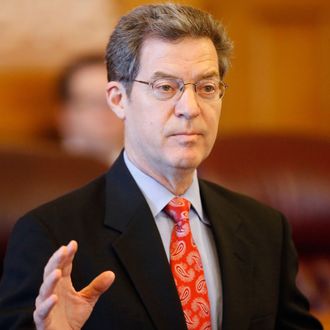
Supply-side economics has been about as good for the people of Kansas as human sacrifice was for the Mayans. Which is to say that both irrational prescriptions for winning the favor of higher powers (be they job creators or gods) imposed terrible costs on their respective civilizations while failing to fend off disaster. Now, even some of the Sunflower State’s low-priests of the supply-side faith are entertaining doubts.
Kansas governor Sam Brownback won two terms in the governor’s mansion preaching the virtues of cutting taxes on the rich. With the enthusiastic support of Republicans in the state legislature, Brownback slashed the top personal-income tax rate by 29 percent and eliminated all income taxes on 330,000 farmers and business owners. This largess was supposed to stimulate a frenzy of investment that would turn the Sunflower State into a conservative utopia of freedom and full employment. But, somehow, the job creators were displeased by Brownback’s offering. In 2015, job growth in Kansas was a mere 0.1 percent, even as the nation’s economy grew 1.9 percent. Brownback pledged to bring 100,000 new jobs to the state in his second term; as of January, he had brought 700.
Meanwhile, the state’s finances came to resemble those of a gambling addict. In 2015, Kansas missed its monthly revenue projections 11 times. Since November, tax collections have come in $81 million below expectations. In the last two months, Governor Brownback has cut $17 million in university funding and delayed $93 million in pension contributions for school teachers and community-college employees, while siphoning off ever more money from the state’s highway projects — over the past two years, more than $750 million has been diverted from infrastructure plans.
Now, as each new month brings another budget gap to be filled, even Brownback’s former champions in the state legislature are losing their faith. Per the Associated Press:
Now many of the same Republicans who helped pass Brownback’s plan are in open revolt, refusing to help the governor cut spending so he can avoid rolling back any of his signature tax measures. If Brownback won’t reconsider any of the tax cuts, they say, he will have to figure out for himself how to balance the budget in the face of disappointing revenue.
“Let him own it,” Republican Rep. Mark Hutton said. “It’s his policy that put us there.”
In the abstract, low taxes and small government sound pretty good to Kansas voters. But when the rubber meets the pot-hole-filled road, people would rather have a functioning public-school system than more opulent McMansions. According to the AP, Republican legislators are worried about signing on to more spending cuts in an election year, because their very conservative constituents seem to hate spending cuts (in March, Brownback enjoyed a 21 percent approval rating in the state, four points behind Barack Obama). Thus, Republican dissidents are demanding tax hikes: Specifically, they want Brownback to repeal the tax exemption for farmers and business owners to raise more than $200 million in additional, annual revenue. The conservative-leaning think tank the Tax Foundation also encourages the exemption’s repeal.
The governor is waiting for Wednesday’s new budget projections before announcing his new plan to balance the books. But his office has indicated that higher taxes on small businesses will not be among his proposals. Brownback doesn’t have to worry about Kansas voters anymore, since he is not allowed to seek a third-term in office. And on the national stage, his staunch defense of the Laffer curve may actually endear him to Republican voters, who are presently choosing between three different denominations of Brownback’s supply-side creed.






























